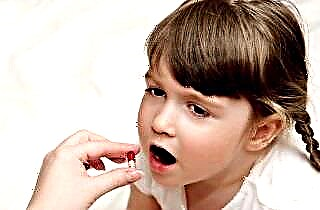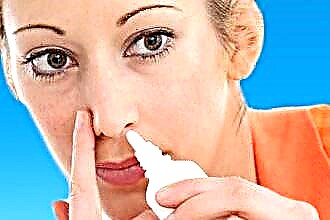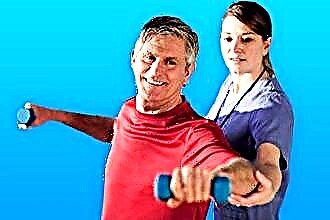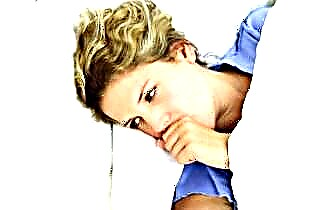Dry cough in children can have varying degrees of intensity and duration - up to several months. However, in any case, he is harmful to health (or rather, not himself, but the disease of which he is a symptom). Hence the conclusion - it must be treated. It is, of course, impossible to give a child the first drug that comes with the inscription "for cough" on the package. After all, the treatment of an unproductive cough in babies is associated with a number of nuances that parents should definitely know about.
Before starting treatment, you need to find out what exactly the child is sick with. Therefore, in order to determine how to treat a dry cough, you should consult with your doctor, who will establish the cause of its occurrence. In the meantime, let's try to figure out what to give a child with a dry cough.
How to eliminate an unproductive cough
 It is important not to forget that even a slight coughing can signal the development of a disease in a child's body. It should also be remembered that virtually all drugs can only suppress coughs for a short time. That is why trying to get rid of only this symptom without going to a doctor is a pointless exercise. It is necessary to treat the disease as a whole.
It is important not to forget that even a slight coughing can signal the development of a disease in a child's body. It should also be remembered that virtually all drugs can only suppress coughs for a short time. That is why trying to get rid of only this symptom without going to a doctor is a pointless exercise. It is necessary to treat the disease as a whole.
The main way to treat unproductive cough in children is to take antitussive drugs prescribed by a doctor. Doctors strongly advise giving children under 2 years of age drugs in the form of a syrup. Although even at 3 years old, a pill is not the most suitable form of medication.
Dry cough remedies for children are divided into 3 types:
- Mucolytics are direct-acting expectorant drugs. They dilute too viscous phlegm well and help to cough up it.
- Secretomotor drugs - expectorant medicines, represented mainly by herbal tinctures. They stimulate an increase in the volume of sputum secreted.
- Antitussive reflex agents qualitatively suppress the cough reflex in a child.
Often, doctors advise parents to use such dry cough remedies for the treatment of a baby: Sinekod, Erespal, Isla-Moos, Ambrobene, Eofinil and Gerbion (with plantain syrup).
If it turns out that the cough is of an allergic origin (the peak of the manifestation of various allergic reactions occurs in the summer), it is necessary to treat it with antihistamines under the supervision of a doctor.
But if a dry cough is accompanied by a high fever, the doctor, suspecting a bacterial infection, may additionally prescribe antibiotics.
Antibiotic therapy
The main goal of antibiotic therapy is to actively suppress the harmful microbes that caused the disease, which manifested itself as a dry cough.
When giving a child any antibacterial agent, parents should be aware that such drugs disrupt the balance of microflora in the intestine. To avoid unpleasant consequences from the gastrointestinal tract and restore the damaged microflora, experts recommend supplementing the course of treatment with probiotics.
So, antibacterial drugs for dry cough are prescribed if the child is diagnosed with:
 acute or chronic bronchitis;
acute or chronic bronchitis;- pleurisy;
- pneumonia;
- tuberculosis.
Antibiotics from the penicillin category are traditionally prescribed for dry coughs with fever. If their treatment does not give visible results, the course is stopped early. It may well happen that the causative agent of the disease has acquired resistance to them. The most popular medicines in this category are Flemoxin, Amoxiclav and Augmentin Solutab.
Those children who have recently undergone antibiotic treatment should begin antibiotic therapy with cephalosporins. In addition, drugs in this category can be used when penicillin drugs are powerless. In terms of effectiveness, Cefuroxime and Cefotaxime are considered to be the best cephalosporins.
Doctors resort to prescribing macrolides to children as a last resort - if a serious inflammatory process is actively developing in the respiratory organs. These antibiotics are the most powerful and effective. Babies can be prescribed Azithromycin, Clarithromycin and Sumamed.
In no case should a child be given antibiotics without permission, without consulting a doctor. Such amateur performance is fraught with a deterioration in the baby's condition and the development of side effects.
Dry cough inhalation
Today, inhalation is very often used to treat dry cough in children. This method soothes a debilitating dry cough, helps relieve inflammation and accelerates recovery.
The inhalation procedure is one of the safest and most gentle methods of dealing with dry cough. Just what a child needs. If the baby easily tolerates the disease, inhalation can completely replace drug therapy. If, in addition to coughing, there are other symptoms, this method will serve as a good addition to the main course of treatment.
 It is best to use a special device for inhalation procedures - a nebulizer. With its help, drugs penetrate the respiratory system to the maximum depth. As a result, the disease heals much faster.
It is best to use a special device for inhalation procedures - a nebulizer. With its help, drugs penetrate the respiratory system to the maximum depth. As a result, the disease heals much faster.
Note that for the treatment of dry cough in children, it is first of all necessary to soften the throat irritated by the cough, reduce the viscosity of the secreted mucus, make it thinner and, finally, remove the phlegm from the bronchi and lungs.
For children, inhalation can be done with Ambrobene, Troventa, Beroteka and Berodual. It is possible to eliminate the inflammatory process in the airways with the help of Rotokan. If the cause of dry cough is bacterial bronchitis, then for inhalation procedures it is necessary to use "Fluimucil", "Gentamicin", "Furacilin" and "Dioxidin".
To moisturize the mucous membrane lining the respiratory system, doctors advise pouring ordinary mineral water into the nebulizer or a simple saline solution, which can be freely purchased at every pharmacy.
How to treat children at 2 and 3 years old
As soon as the baby began to cough, the first action of his parents should be to visit the doctor or call him at home. The pediatrician will carefully examine the child, listen to the bronchi and lungs, and only then make the appropriate appointment situations. Remember: self-medication can significantly harm the baby.
The child's condition will be relieved by giving him a lot of drink. For this, it is best to use warm milk, rosehip, linden, chamomile teas and even ordinary drinking water. Thus, it is possible to achieve a transition from dry to wet cough. Warming compresses should be done only when the body temperature is kept within normal limits.
Most often, a pediatrician prescribes such medicines for dry cough in children at the age of 2 and 3 years:
 Mucolytics (to liquefy sputum that is too thick): Lazolvan (suspension - 1 ml, syrup - 7.5 mg each), Levopront (syrup - 1 mg each) and ACTS 100 (400 mg per day).
Mucolytics (to liquefy sputum that is too thick): Lazolvan (suspension - 1 ml, syrup - 7.5 mg each), Levopront (syrup - 1 mg each) and ACTS 100 (400 mg per day).- Mucoregulators (to restore the normal functioning of bronchial cells that produce phlegm) - "Mukopront" and "Mukodin" (both syrups - 100 mg each).
- Expectorants - "Prospan" and "Ambroxol" (both syrups - 2.5 ml).
- Antitussives (for affecting the cough center in the brain) - "Codipront" (from 2 or 3 years old, half a teaspoon), "Sinekod" (in the form of drops, from 2 years old - 15 drops each, from 3 years old - 5 ml each ), "Sedotussin" (from 1.5 to 3 ml per 1 kg of the child's body weight).
- Combined (with antitussive, expectorant and mucolytic effect) - "Stopussin" (the dosage depends on the weight of the child) and "Tussin plus" (half a teaspoon each).
If the cough becomes barking, breathing difficulties appear, and the temperature remains within normal limits, it is allowed to give the baby warming foot baths. They are needed so that the blood rushes to the legs, and then spreads throughout the body. As a result, the respiratory system will be warmed and the swelling will decrease.
To eliminate dry cough in children who are already two or three years old, you can use homeopathic remedies and herbal pharmaceuticals (for example, the medicine "Gedelix"). If the cough has worsened and complications have begun to develop, the baby is prescribed a course of treatment with bronchodilators (drugs to dilate the bronchi), as well as anti-inflammatory drugs or antibiotics.
At home, such young children should be inhaled with great care. After all, such procedures can provoke a spasm of the respiratory system, and the baby will begin to choke. A child at 2 years old is allowed to breathe decoctions of chamomile and mother-and-stepmother. Of course, in limited quantities. In the absence of allergies, you can make an inhalation decoction of menthol, eucalyptus and thyme.
It is forbidden to treat dry cough in children at 2 and 3 years of age on their own with antibacterial drugs!
What drugs are allowed at 5-6 years of age
 Children who have reached the age of 5 can already be given different forms of medicines. Such an adult child is quite capable of swallowing a pill. Thus, the range of medicines is expanding significantly. Dry cough in children at the age of 5 and 6 is treated with pharmaceutical preparations - mainly syrups and tablets.
Children who have reached the age of 5 can already be given different forms of medicines. Such an adult child is quite capable of swallowing a pill. Thus, the range of medicines is expanding significantly. Dry cough in children at the age of 5 and 6 is treated with pharmaceutical preparations - mainly syrups and tablets.
The most affordable and often prescribed drugs at this age are pills. Dry cough in a child at this age can be successfully treated with "Codelac" or "Terpinkod". It is very important not to mix these medicines with any other. Especially with medicines for wet cough. If these medications are taken correctly, the treatment will be effective.
The most budgetary remedy for dry cough is "Termopsol". These pills are always available in any pharmacy. True, they are not in the most conspicuous place, so you should ask your pharmacist about their availability. In addition to pills, unproductive cough in 5-6-year-old children is perfectly treated with syrups: "Bronholitin", "Stopussin" and "Sinekod".
If parents are afraid to give their child the so-called "chemistry", you can pick up something from herbal medicines. For example, the well-known Doctor Mom syrup (by the way, it is also produced in the form of tablets and ointments), as well as syrups of plantain, marshmallow and licorice.
 Another option for those who avoid pharmaceuticals is breast fees. These multi-ingredient herbal preparations can be found in almost any pharmacy. It is very easy to make decoctions from them or brew like tea. The drug made from them is convenient to dose for the child. Breast fees help to cure an unproductive cough in a short time and prevent the development of complications.
Another option for those who avoid pharmaceuticals is breast fees. These multi-ingredient herbal preparations can be found in almost any pharmacy. It is very easy to make decoctions from them or brew like tea. The drug made from them is convenient to dose for the child. Breast fees help to cure an unproductive cough in a short time and prevent the development of complications.
And, of course, sucking lollipops. Without a doubt, apart from syrups, children like this form of medicine the most. Tasty cure dry coughs help such herbal lozenges: "Doctor Theiss with sage", already mentioned "Doctor Mom" and "Septolete".
Parents should explain to the child that such a “candy” should be sucked up to the end and try not to gnaw it. Then the effect of these funds will be full.
Treating a cough with inhalation is quite simple and effective. This method is great for children exactly 5 and 6 years old. After all, they already perfectly understand what is happening, and realize that they are sick. In addition, they are able to verbally concretize their feelings. It is best to use mineral water or eucalyptus essential oil for such inhalations. It is advisable to carry out the procedure with a nebulizer. But if it is not possible to purchase it, you can inhale the healing aromas of eucalyptus while bathing in the bathroom.
What can you give a child at 8 years old
As mentioned, before starting treatment for an unproductive cough, it is important to find out what caused it. This is necessary in order for the therapy to be comprehensive and to fight not only with the consequence, but also directly with the causative agent of the disease itself. The range of drugs for dry cough that can be taken at the age of 8 is quite wide. Therefore, there will be no problems with the choice.
 Here are some of the medications most commonly prescribed for 8-year-olds as an example:
Here are some of the medications most commonly prescribed for 8-year-olds as an example:
- "Biocaliptol" soothes a painful and irritating cough in the throat without affecting its physiology. Consists of eucalyptol, belladonna tincture, folcodin and guaiacol. From the age of 8, it can be taken 4-8 teaspoons per day.
- (in the form of suppositories) - it is characterized by antitussive, bactericidal and antipyretic effects. Consists of eucalyptol, beclotymol, paracetamol and folcodin. The drug is contraindicated in asthmatic cough and hepatocellular failure. Dosage - 1 suppository twice or three times a day.
- Paxeladin is an antitussive agent. It is allowed to use for coughs of any origin. There is a syrup form. Dosed as follows: 1 scoop is designed for 10 kg of weight. This is the daily dose. Children 4-15 years old are supposed to drink 2-3 scoops a day.
- "Stopussin" is a universal drug (drops). It is characterized by mucolytic, antitussive, bronchodilator and expectorant properties. It dilutes phlegm, helps its excretion, reduces the frequency of coughing attacks. Contraindicated in case of individual sensitivity and myasthenia gravis. It should be used only after a meal. The required number of drops should be dissolved in 100 ml of liquid (water, tea or fruit juice). Children weighing 12 to 20 kg should take 14 drops three times a day. And those whose body weight is from 20 to 30 kg should drink the same amount of drops, only 4 times a day.
Let's summarize
 Today, there are many drugs that can cure an unproductive cough in children of different ages. When choosing such a drug, you need to pay attention to the following information on the packaging: from what type of cough it can be used, from what age it is allowed to take and, of course, the expiration date.
Today, there are many drugs that can cure an unproductive cough in children of different ages. When choosing such a drug, you need to pay attention to the following information on the packaging: from what type of cough it can be used, from what age it is allowed to take and, of course, the expiration date.
In no case should one engage in self-treatment of the child. Any action without an established diagnosis can harm the health of the baby. Prescriptions can only be given by a doctor. If you choose the wrong medicines, you can not count on the desired therapeutic effect. In addition, such self-activity is fraught with the constant occurrence of relapses and the transition of the disease into a chronic form.

 acute or chronic bronchitis;
acute or chronic bronchitis; Mucolytics (to liquefy sputum that is too thick): Lazolvan (suspension - 1 ml, syrup - 7.5 mg each), Levopront (syrup - 1 mg each) and ACTS 100 (400 mg per day).
Mucolytics (to liquefy sputum that is too thick): Lazolvan (suspension - 1 ml, syrup - 7.5 mg each), Levopront (syrup - 1 mg each) and ACTS 100 (400 mg per day).

